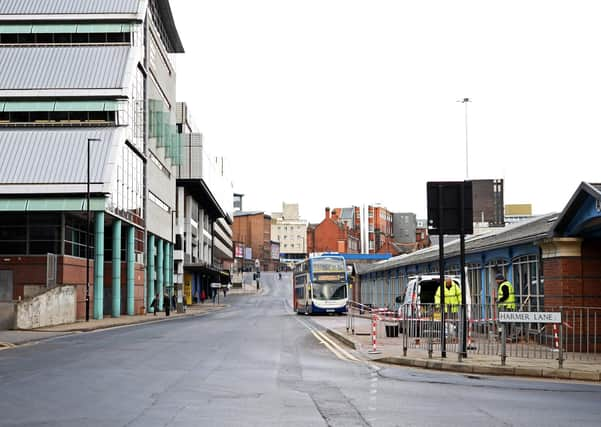South Yorkshire could follow Manchester’s bus franchising plan: Dan Jarvis


With Covid finally receding, we’re acting on that ambition. We’ve just extended sharply discounted 80p fares all the way up to age 21 for a year – a significant intervention both to help revive ridership, and to help young adults who are facing enormous challenges.
Now we’re making another £3.2m down-payment on reform – to buy our first electric buses, upgrade bus stops, and expand real-time information. It’s not enough, but it’s a start.
Advertisement
Hide AdAdvertisement
Hide AdFor the longer term, we’re urgently working on how to implement lessons from the comprehensive review my colleague Clive Betts led last year, looking at fares, services, integration with other transport, and conversion to zero-emissions vehicles – all the key elements we have to fix. It’s the practical detail of what good looks like, and how to get there. That includes ownership. Greater Manchester’s commitment to franchising is a major shot in the arm for reform.
My bottom line is we need a structure that lets us build the service we need. Franchising will be among the options.
This may seem an odd time for ambition. Even before Covid, our system was in managed decline. Over the past decade, passenger journeys fell 21 per cent. Various factors are behind this, but they include major issues around reliability and frequency, complex ticketing, and poor integration between services. Underlying it all is a 48 per cent cut in funding since the Conservatives took power in 2010.
Funding for buses in London is £76 per head: in Sheffield it is £5. It’s unacceptable.
Advertisement
Hide AdAdvertisement
Hide AdCovid has supercharged these challenges. Essential services were heroically maintained, but ridership inevitably collapsed: the system is only surviving with emergency subsidies.
Based on current trends, passenger numbers will drop 20 per cent, reducing revenue around £24m a year.
That crisis must indeed be priority one. Above all, we need a gradual transition as we exit lockdown, and to actively encourage people back onto the buses. The government must recognise the need for continued support – for our Supertram and rail networks as well as our buses.
But beyond that we have a choice. I am for ambition, for one reason above all. The alternative is ever greater dependency on the car – and that means communities that are less liveable, more afflicted by air pollution and congestion, and where the disadvantaged are left behind.
Advertisement
Hide AdAdvertisement
Hide AdAir pollution is the UK’s biggest environmental health threat, estimated to cost around £6bn a year, and contribute to 36,000 deaths – quite apart from its climate change impacts. South Yorkshire has 28 areas with failing air quality. Congestion meanwhile costs an estimated £7bn a year, and is already damaging our prospects for growth.
Bad bus services directly undermine aspiration. We have among the lowest social mobility in the country. Poor, expensive public transport is a barrier to employment and education, and hits low-income households, women, children and the elderly with mobility inequality and social isolation. Building something better is hard. It demands investment and political will. That makes it tempting to aspire to nothing more than scrabbling back to the status quo.
But we only need to ask ourselves this: what future do we want, beyond our immediate crisis? Do we want one where our cities can breathe, where everyone has access to mobility, where we build a more liveable community? Or do we want what we are headed for now – a region built on growing dependency on one mode of transport, where not having a car is a death-knell for aspiration, and having one means being trapped in congestion?
For me, the choice is clear. I intend to invest – but the brutal reality is that much still depends on the government. Without adequate, long-term, reliable funding, we will struggle to escape survival mode.
Advertisement
Hide AdAdvertisement
Hide AdThe government’s National Bus Strategy promises a ‘revolution’: a welcome, overdue admission of just how disastrous their ideologically driven deregulation has been. But the strategy is long on aspiration and short on detail, with no clarity over how 85 per cent of the promised £3bn will be spent, nor how much will reach places like South Yorkshire.
In the here and now, a June cliff-edge in government support threatens to force major service cuts, while the crass politicisation of ‘levelling up’ funding sows mistrust that they will really fix the inequity of the past.
It’s only by building a better service that we can get ridership back to pre-Covid levels, and then beyond them. I hope the government deliver what we need. But whatever happens, I will be fighting for that world-class service – because that is the only ambition that makes sense.
Support The Yorkshire Post and become a subscriber today. Your subscription will help us to continue to bring quality news to the people of Yorkshire. In return, you’ll see fewer ads on site, get free access to our app and receive exclusive members-only offers. Click here to subscribe.
Comment Guidelines
National World encourages reader discussion on our stories. User feedback, insights and back-and-forth exchanges add a rich layer of context to reporting. Please review our Community Guidelines before commenting.